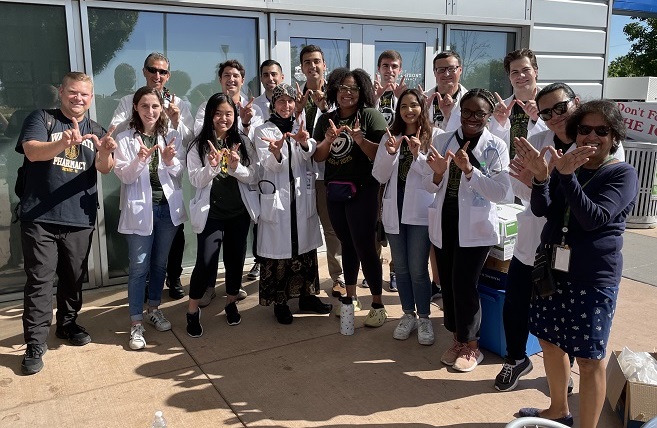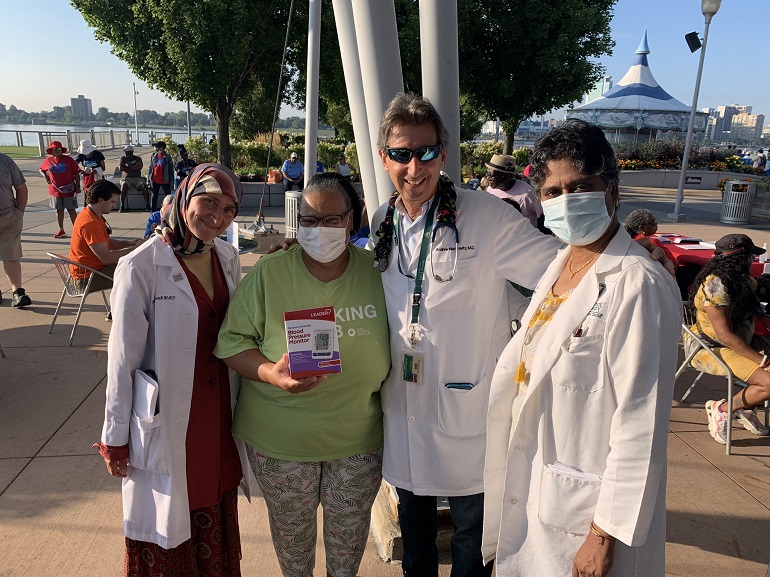
Medical and pharmacy students from Wayne State University have completed another year volunteering at a summertime health screening popular with community members who walk the Detroit Riverwalk every Tuesday morning.
Detroit Riverfront Walkers are Detroit-area men and women who stride along the riverfront to embrace a healthier lifestyle by introducing fun fitness activities, health screenings and wellness education. Every Tuesday when weather permits, WSU students provide blood pressure screenings, and educational talks about nutrition and common medical issues.
The community service program was started by School of Medicine Associate Professor Emeritus and Director of Community Engagement Jennifer Mendez, Ph.D., and first offered to medical students in June 2014. The sessions are offered in collaboration with the Detroit Riverfront Conservancy.
The School of Medicine student volunteer efforts are organized by second-year medical students Chayton Fivecoat and Denise Bilbao, who are co-community service chairs for the American Medical Association WSU chapter. The duo trade off working alongside faculty in training volunteers how to interact with patients, collect histories and take blood pressures.
Students learned to build rapport with the patient, eliciting and logging medical histories and current medications, recording blood pressures, and connecting patients with resources and information to better manage their health through diet and exercise.
“The key to this year's success was our team's dedication to thoroughly training our volunteers at the start of each session,” Bilbao said. “In addition to going through the technical aspects of their job for the day, we really focused on emphasizing the more humanistic sides of their interactions with patients. The faculty members drove home the importance of appreciating our patients, seeing them as a person rather than just a set of vitals and diagnoses, and trying to learn from each interaction. In my portion of the training, I would also emphasize the importance of volunteers taking their time with each patient and establishing rapport with patients through simple gestures like asking how their morning walk went. I think that this had a huge impact on how our patients viewed the program, because they were greeted with friendly faces that were eager to learn and converse with them, rather than just robotic volunteers going through the motions.”
Seeing patients in a clinic can be such an isolated experience that at times it detracts from the importance of understanding an individual’s lifestyle, values and personality, Bilbao added. “The Riverfront Walkers program is such a unique experience, as patients come to you in the midst of a fun event they enjoy, often accompanied by their friends or family, making small talk, letting you really get to see them in their normal, everyday state of being. Participating in the program is an incredible opportunity for personal and professional growth that emphasizes the importance of considering the non-medical aspects of a patient’s life, on top of being a great chance to foster your technical and communicative clinical skills.”
The students earn service-learning credit for participation. Between June and late August of this year, students and faculty recorded 693 blood pressure screenings, a sharp increase from one year ago. The entire program was placed on hold in 2020 because of the COVID-19 pandemic. Although it returned in 2021, that summer saw fewer participants than previous years.

“This summer it was great to see many of our previous years’ riverfront walkers drop by and participate in the screening program,” said Department of Internal Medicine Associate Professor and Chief of the Division of Primary Care and Population Health Neelima Thati, M.D. “Many of them admitted they had not come out for two years. It was very heartwarming to see our students engage with the walkers as part of the blood pressure screening program. We had a record number of them show up this year since the pandemic, which serves as a prime example of building trust in the community.”
Volunteers included first- and second-year medical students, Internal Medicine and Med-Peds residents, as well as students from the WSU Eugene Applebaum College of Pharmacy and Health Sciences.
Linh Pham, a Class of 2024 Doctor of Pharmacy candidate, led pharmacy student volunteers and worked with Bilbao and Fivecoat to coordinate care.
“The Riverfront Walkers enjoy being able to help students practice their clinical skills while also learning more about their health from the students. Co-Director for Service Learning Segment 1 and Adjunct Assistant Professor of Pharmacy Practice Rima Charara, Pharm.D., and other faculty volunteers also helped the program run smoothly and successfully this year. Dr. Charara especially makes each session fun and an enjoyable educational experience in which students are able to have a more hands-on opportunity to learn outside of the classroom,” Pham said. “Every week, I always walked away feeling very grateful and appreciative of the opportunity to be able to give back to the local Detroit community. The Riverfront Walkers made every session enjoyable and helped me gain more experience obtaining blood pressures, as I can confidently say after this opportunity that I am very comfortable with measuring blood pressures and have strengthened my patient counseling skills. I also enjoy being able to collaborate with the medical students and work alongside them to further expand our clinical skills and give back to the community.”
Assistant Professor of Obstetrics and Gynecology Andrew Markowitz, M.D., ’85 FACOG, is one of several WSU faculty members who volunteer to supervise and guide students at the weekly community outreach event.
“I have been honored to be able to mentor the next generation of medical students,” said Dr. Markowitz, course director of the School of Medicine’s Population, Patient, Physician and Professionalism year 1. “The students are fortunate to be able to begin direct patient contact just weeks into their medical training. In addition to taking blood pressures, students begin to understand and experience the joy of the clinical interaction, and the importance of empathetic communication in fostering trust. The program reinforces community engagement and is emblematic of the mission of Wayne State University School of Medicine.”